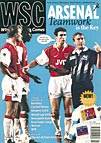 He may have excellent shot-stopping ability, but Robert Fordham wonders if David James' occasional moments of madness have cost him his place at Liverpool
He may have excellent shot-stopping ability, but Robert Fordham wonders if David James' occasional moments of madness have cost him his place at Liverpool
So, farewell David James. Consigned to the subs’ bench after over 200 consecutive appearances for Liverpool, and at a time when papers were still writing about you as an outside England contender, given the injuries to Walker and Seaman. A tale that begs a question: how on earth did the archetypal "dodgy keeper" last so long?
From the moment Bruce Grobbelaar was injured in Roy Evans’ third game in charge until Brad Friedel was signed at Christmas, David James played in part because there was literally no alternative. For three and a half years, James was the only keeper on the club’s books who had played League football, for Liverpool or anyone else, so to drop him would have been a bigger gamble than to play him, whatever his form.
Not that his form merited dropping him that often. At the time he was dropped, only Peter Schmeichel had more clean sheets in 1997-98. Last season, one in which James was deemed by everyone to have cost Liverpool the title, only Arsenal and Aston Villa conceded fewer goals; Man United let in seven more.
James has, of course, also been a major part in Liverpool’s attacking success. When he first joined the club, a significant argument in favour of Grobbelaar keeping his place was that James lacked the confidence in possession to release the ball quickly to his teammates, the key to the build-from-the-back style. After years of practice, he is far more adept at this than, for instance, his erstwhile England rival, Nigel Martyn, who was reduced to punting the ball hopefully up field so often against Chile at Wembley in February, gifting the opposition the ball.
In addition, James is one of the best shot-stoppers in the business, has a good (if occasionally lucky) disciplinary record, and played for England just a year ago, keeping a clean sheet. So where’s the catch?
Well, he can’t, can he? At least not reliably. If you just fail to reach a shot because your reactions aren’t quick enough and your arms aren’t long enough, then people will say a shot was perfectly placed and you couldn’t get there. If, on the other hand, you reach that shot but later drop a cross from which your opponents score, you become a clumsy idiot. ‘Dodgy keeper’ is a much better chant than ‘fractionally slow keeper’, even if the two faults cost the same number of goals.
James cannot complain that Evans has not shown enough faith in him. When Friedel was signed, he still persevered with James while Liverpool embarked on a reasonable unbeaten run in the League. Yet as David watches this summer’s World Cup, perhaps he will wonder what difference a commanding centre half might have made to his career. If Evans had been able to buy Matt Elliott, say, would he have felt obliged to chase Friedel? Since Mark Wright’s injuries have at last got the better of him and Neil Ruddock’s ‘pace’ has become even more of a joke, Liverpool’s vulnerability in the air has greatly increased. Should Evans, or his successor, manage to get Friedel some better aerial cover, then Brad could have a very successful career in England, permits permitting.
So far he has had the misfortune to watch some stunning goals fly past him – notably from Alan Thompson and David Ginola – as well as some headers where it was the lack of marking rather than the goalkeeping that was at fault. He has kept possession admirably, and has made some good stops. If Liverpool do sign a decent centre back, and injury, suspension or deportation gives James another chance, he may just be back to stay.
However marginally, though, I must say I hope not. Having to hold your breath every time a cross comes over is just a bit too much to take.
From WSC 135 May 1998. What was happening this month